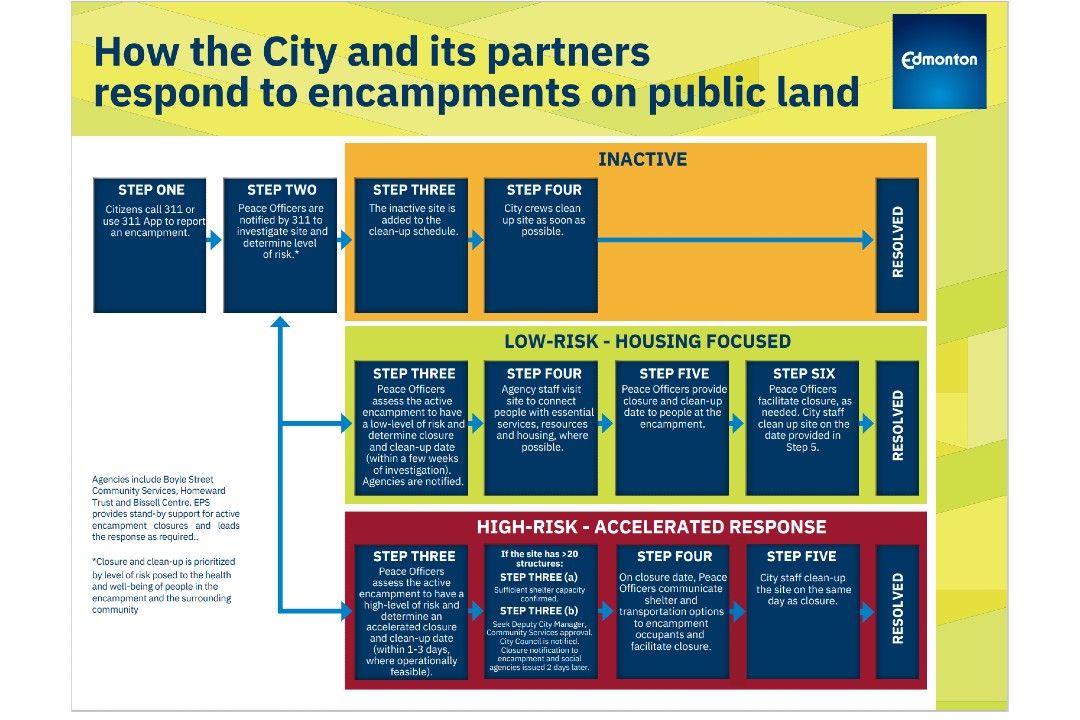Mayor Amarjeet Sohi has called for a special city council meeting to discuss declaring a housing and houselessness crisis. Other items as council returns from its holiday break include land sales at the Exhibition Lands redevelopment and a permanent program to incentivize clean energy projects.
A community and public services committee meeting is scheduled for the morning of Jan. 15, followed by the special city council meeting in the afternoon. An urban planning committee meeting is set for Jan. 16, and an executive committee meeting is on Jan. 17.
Here are some key items on the agenda:
- Sohi released a statement on Jan. 11 saying he will make a motion to declare a housing and houselessness emergency at a special city council meeting on Jan. 15. Sohi said if council approves the declaration, he will seek emergency meetings with the provincial and federal ministers in charge of housing as well as Cody Thomas, Grand Chief of the Confederacy of Treaty Six First Nations. "I know that declaring an emergency on housing and houselessness will be useless without fast and meaningful action," Sohi said in a release. "We need coordination of planning, immediate increase in investments, and human-centred and reconciliation-focused action." Front-line staff have tried to dismantle encampments with compassion under difficult circumstances, Sohi said, but "recent actions at encampment clearances may not be in line with our commitments to upholding (Indigenous) reconciliation, and our obligation of care in communities across the city." Jason Nixon, Alberta's minister of seniors, community, and social services, said on Jan. 12 that he would not attend an emergency meeting, calling Sohi's statement "a complete political stunt."
- Following interviews, city administration has chosen a single potential buyer for the first two land parcels for the Edmonton Exhibition Lands redevelopment project. The market value sale requires approval from councillors at an executive committee meeting on Jan. 17. The potential buyer will remain private until the sales are finalized. The city said the proponent intends for all housing built on the parcels to be constructed to a net-zero-ready standard, allowing for renewable energy systems to be installed.
- Executive committee will look at a bylaw that would establish a permanent Clean Energy Improvement Program. The program to finance clean energy retrofits and installations has been popular in Edmonton, with funding often running out ahead of schedule (and in one instance, in just one day). Committee can recommend that council votes on the bylaw, and if the bylaw is approved, applicants can receive loans of up to $50,000 for residential projects and $1 million for commercial projects that would then be repaid through property taxes. The program is estimated to cost the city about $20 million in the next four years.

Mayor Amarjeet Sohi said he had hoped changes to the High Risk Encampment Response would address a lack of alignment with Edmonton's commitments to reconciliation and care for communities, but "it is clear more changes are needed." (City of Edmonton)
- The city's updated affordable housing strategy is nearly ready for review and council scrutiny. The updated strategy will go to the community and public services committee meeting on Jan. 15. Committee members can then send it to a regular council meeting to be voted on. The strategy's three goals are that Edmontonians have access to affordable housing in every neighbourhood, have access to supportive housing, and have increased awareness of housing needs and the importance of affordable housing. The city hopes to see more than 30,000 subsidized housing units created by 2050, and that all new affordable housing units achieve net-zero emissions, among several other objectives.
- Councillors are set to revisit a report on closed and shared streets downtown at the urban planning committee meeting on Jan. 16. This discussion was postponed in December. The city said it is working to create the conditions for car-free spaces and is looking for more opportunities for temporary city-supported closures in priority areas like Rice Howard Way and 104 Street. Postponed from the same meeting is a report on how on-demand transit could be co-mingled with DATS for efficiency.
- Council has the option to forgive about $74,000 in unpaid taxes and potentially accrued penalties for Al-Mustafa Academy and Humanitarian Society. The organization, which operates a private primary and secondary school at the former Bellevue School, did not reapply for a tax exemption after purchasing the property in 2019. Executive committee could recommend that council forgive the taxes through the Retroactive Municipal Tax Relief policy.
- The city is unable to mow grass and pull weeds to target service levels due to a lack of budget, according to a report that goes before community and public services committee on Jan. 15. The amount of green space that needs to be mowed has increased by 5.1% while the budget for mowing public spaces has decreased since 2019 by 9.3%. Shrub beds have increased in area by 18.8% while the budget to tend them has been reduced by 11.9%. A jurisdictional scan found Edmonton's standards are similar to other municipalities when it comes to high-priority assets like sports fields, but other municipalities tend to landscape lower-priority green spaces more regularly than Edmonton does.
